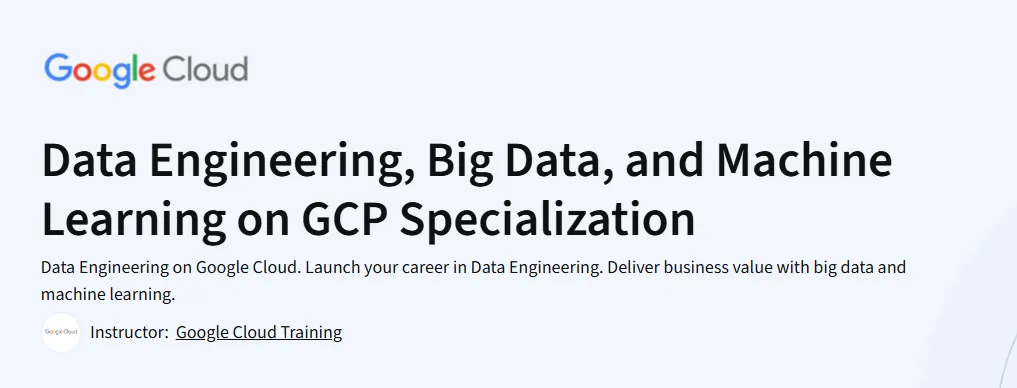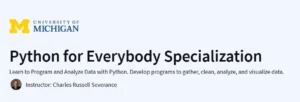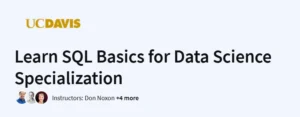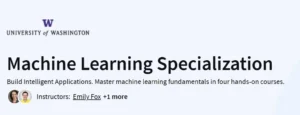What will you learn in Data Engineering, Big Data, and Machine Learning on GCP Specialization Course
Design and operationalize data pipelines using GCP services like Dataflow, Pub/Sub, BigQuery, BigTable, and Dataproc.
Perform end-to-end data engineering: ingestion, transformation, storage, and analytics at scale on GCP.
Apply machine learning using AutoML, BigQuery ML, Vertex AI, and custom model deployment pipelines.
Design ML pipelines and MLOps workflows with Vertex AI feature store, hyperparameter tuning, online/batch inference, and model monitoring.
Program Overview
Module 1: Google Cloud Big Data and Machine Learning Fundamentals
⏳ ~5 hours
Topics: Introduces GCP data-to-AI lifecycle; overview of BigQuery, Dataflow, Pub/Sub, Dataproc, and Vertex AI.
Hands‑on: Complete cloud skills labs on Pub/Sub, Dataflow, BigQuery; earn badges demonstrating proficiency.
Module 2: Modernizing Data Lakes and Data Warehouses with Google Cloud
⏳ ~8 hours
Topics: Differences between data lakes vs. warehouses; design patterns using Cloud Storage, BigQuery, Dataproc; role of data engineers.
Hands‑on: Load data into BigQuery, run transformation jobs via Dataproc, optimize storage and schema using real datasets.
Module 3: Building Batch Data Pipelines on Google Cloud
⏳ ~17 hours
Topics: Batch ETL vs. ELT, Apache Hadoop & Spark on Dataproc, Dataflow pipelines, orchestration via Cloud Composer and Data Fusion.
Hands‑on: Create batch pipelines with Dataflow, deploy Hadoop jobs on Dataproc, orchestrate workflows using Composer.
Module 4: Building Resilient Streaming Analytics Systems on Google Cloud
⏳ ~8 hours
Topics: Real‑time streaming use cases, Pub/Sub messaging, Dataflow streaming with windowing & transformations, integration with BigQuery.
Hands‑on: Stream data via Pub/Sub → Dataflow → BigQuery; implement windowed processing and real-time data dashboards.
Module 5: Smart Analytics, Machine Learning, and AI on Google Cloud
⏳ ~6 hours
Topics: ML vs AI vs deep learning; use of unstructured data APIs, building models via BigQuery ML and Vertex AI AutoML.
Hands‑on: Train and evaluate models with BigQuery ML, experiment with AutoML in Vertex AI, build notebook-based predictive analytics.
Get certificate
Job Outlook
Equips learners for roles such as Cloud Data Engineer, Machine Learning Engineer, and MLOps Specialist.
Ideal for professionals preparing for the Google Professional Data Engineer or Machine Learning Engineer certifications.
Specification: Data Engineering, Big Data, and Machine Learning on GCP Specialization
|
FAQs
- Basic familiarity with Python, SQL, and Linux is recommended but not mandatory.
- The course introduces GCP services gradually.
- Hands-on labs guide learners through data engineering and ML pipelines.
- Designed for professionals with general technical curiosity.
- Prepares learners for more advanced GCP certifications later.
- Covers designing and operationalizing data pipelines using Dataflow, Pub/Sub, BigQuery, BigTable, and Dataproc.
- Includes batch and streaming data pipelines with orchestration via Composer and Data Fusion.
- Explains MLOps workflows with Vertex AI and BigQuery ML.
- Hands-on labs simulate production-grade deployment scenarios.
- Focuses on scalable, cloud-based solutions for enterprise data problems.
- Concepts are explained in clear, conceptual terms.
- Provides insight into big data architecture and cloud analytics.
- Helps managers oversee data-driven projects and pipelines.
- Supports understanding of ML model deployment and monitoring.
- Enhances decision-making for cloud-based projects.
- Prepares learners for roles like Cloud Data Engineer, ML Engineer, and MLOps Specialist.
- Aligns with Google Professional Data Engineer and ML Engineer certification pathways.
- Provides practical experience with GCP services widely used in industry.
- Helps build a portfolio of cloud-based data and ML projects.
- Strengthens resume with both theoretical and hands-on expertise.
- Introduces ML concepts using BigQuery ML and Vertex AI AutoML.
- Focuses on practical model training, evaluation, and deployment.
- Advanced topics like feature engineering and MLOps are covered at an intermediate level.
- Emphasizes end-to-end ML pipelines on cloud platforms.
- Provides a foundation for deeper ML and AI specialization later.





